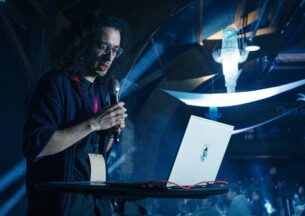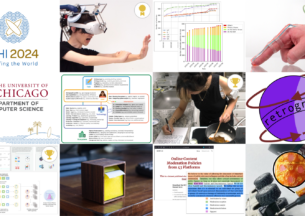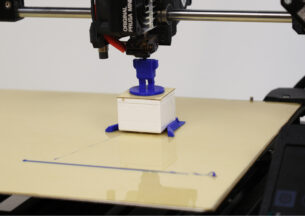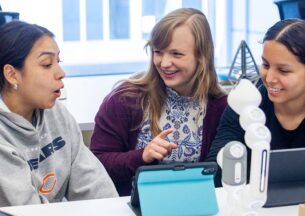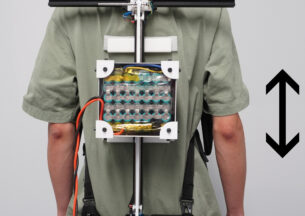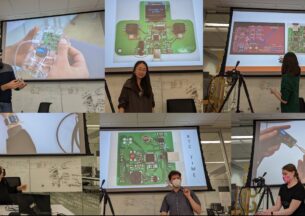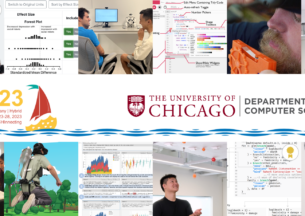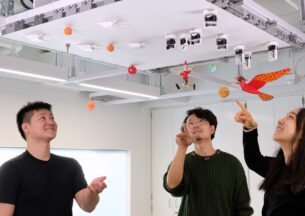Sarah Sebo Awarded Prestigious CAREER Grant for Research on Robot Social Skills in Collaborative Learning
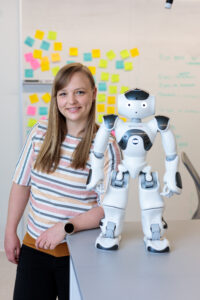
The U.S. National Science Foundation (NSF) has awarded Assistant Professor Sarah Sebo of the University of Chicago’s Department of Computer Science the highly prestigious CAREER grant. This award supports early-career faculty who have the potential to serve as academic role models in research and education and to lead advances in the mission of their department or organization. Sebo received the award for her innovative research project aimed at enhancing robot social skills to improve collaboration and learning outcomes in both adult and elementary school settings. Her work promises to revolutionize the integration of robots in educational environments, thereby enhancing the learning experience for children and supporting teachers in managing collaborative learning activities.
Importance of Collaborative Learning
Collaborative learning, an instructional method where students work together towards a common goal, has been shown to significantly enhance problem-solving skills, critical thinking, and social networks among children. Sebo’s research is crucial as it addresses the need for effective tools to support teachers in managing collaborative learning environments. Robots equipped with advanced social skills can help monitor group behavior, keep students on task, and provide individualized assistance—thus filling the gap when teachers cannot interact with all groups simultaneously.
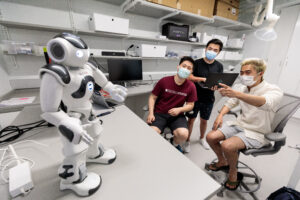
“Developing a robot to interact with multiple people in a social context is a very challenging task,” explained Sebo. “If the robot interrupts someone, misunderstands them, or has a speech delay, groups of people tend to just ignore the robot, even if a robot could provide valuable information or help to the group. This project focuses on how we can develop social skills that allow robots to be effective and helpful social collaborators with groups of people.”
The goal of Sebo’s research project is to enable a robot to collaborate effectively with groups of people and contains three main objectives. The first aim focuses on designing advanced social skills for robots intended to improve their interactions in collaborative groups of adults. These skills include building rapport, adapting to human-human relationships, and promoting group norms. The success of these designs will be tested in real-world adult group settings to ensure that robots can effectively manage and enhance group dynamics.
The second aim involves adapting these social skills for a new context: facilitating collaborative learning among 3rd to 5th grade students. Recognizing that young children are still developing their collaborative abilities, Sebo will tailor the robot’s social skills to support and guide children through group learning activities. This stage will involve collaboration with local teachers and students to understand how best to implement and refine these skills.
The final stage of Sebo’s project involves a comprehensive user study to evaluate the robot’s performance in real-world classroom settings. This study will involve recruiting 3rd to 5th grade students to participate in collaborative learning activities facilitated by either a robot that exhibits the developed social skills or a control robot without these capabilities. By measuring student learning outcomes, engagement, and enjoyment, Sebo seeks to demonstrate that robot social skills are crucial for effective and engaging educational interactions.
Broader Impacts
The broader impacts of Sebo’s research extend well beyond educational settings. The advanced social skills developed for these robots could be adapted for use in various fields, including search and rescue operations and hospital environments, where effective human-robot interaction is essential. This research also has the potential to transform educational practices by providing new tools for interactive and engaging learning experiences, especially in collaborative group settings.
“Research in the field of human-robot interaction has predominantly focused on studying and improving interactions between one human and one robot,” Sebo said. “However, robots deployed in real-world settings frequently interact with multiple people simultaneously. The work of this project will develop social skills robots can use in many contexts that involve multiple people, such as interacting with both parents and children in the home, contributing as a member of a human-robot collaborative workplace team, and engaging with groups of people in public spaces.”
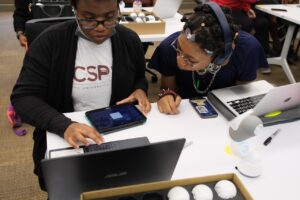
In addition to her research, Sebo is committed to educational outreach and resource development. She plans to create instructional materials and collaborative learning activities for 3rd to 5th grade teachers, making it easier for them to integrate robots into their classrooms. Furthermore, Sebo will continue to teach a summer robotics course to underserved high school students through UChicago’s Collegiate Scholars Program. This course aims to increase their interest in computer science and robotics by providing hands-on experience with robot programming and design.
“I am deeply committed to making a positive impact within the Chicago South Side community,” expressed Sebo. “NSF’s support of this project trickles down to support the robotics course that my PhD students and I teach to local CPS high school students as a part of UChicago’s Collegiate Scholars Program. This course aims to give many students their first opportunity to design and program a robot and develop confidence that they can pursue a career in robotics. Additionally, I hope to share the outcomes of this project with the broader community through resources for elementary school teachers.”
Sebo’s CAREER award is a testament to her innovative approach and dedication to advancing the field of human-robot interaction. Her research not only promises to improve the effectiveness of robots in educational settings but also holds potential for broader applications in various collaborative environments. Through her work, Sebo is poised to make significant contributions to both the academic community and society at large, demonstrating the transformative power of integrating advanced robot social skills into real-world scenarios.




